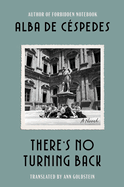
Readers looking for tips on how to annoy a fascist government will savor Alba de Céspedes's (Forbidden Notebook) magnificently incendiary novel There's No Turning Back, first published in Italy in 1938, during Mussolini's reign. As Ann Goldstein, who translated from the Italian, notes in her introduction, this feminist manifesto about "eight young women living in a convent-boarding house in Rome," all of them university students and "united in the task of finding their way in the world," infuriated authorities so much that the government blocked further publication, albeit after 20 printings. This translation, based on de Céspedes's 1966 final revision, shows contemporary audiences what all the fuss was about.
Among the women studying at the Grimaldi school are Emanuela, who became an unwed mother after her fighter-pilot suitor died, which leads to deceptions when a new man enters her life; and Xenia, whose aspiring businessman boyfriend promises riches and security, a pledge that comes with an unappetizing side order of paternalism. Augusta is baffled by women who just want to stay home and marry, while wealthy Anna doesn't want to study anymore yet contends with difficult relatives, including an imperious Grandma so convinced that everyone wishes she'd hurry up and die that she suspects them of poisoning the meatballs. "To free herself from the tyranny of the man, the woman has to take his place," Augusta warns. Mussolini must have loved that line. Enlightened modern readers genuinely will, however, along with the rest of this forward-thinking novel. -- Michael Magras, freelance book reviewer

